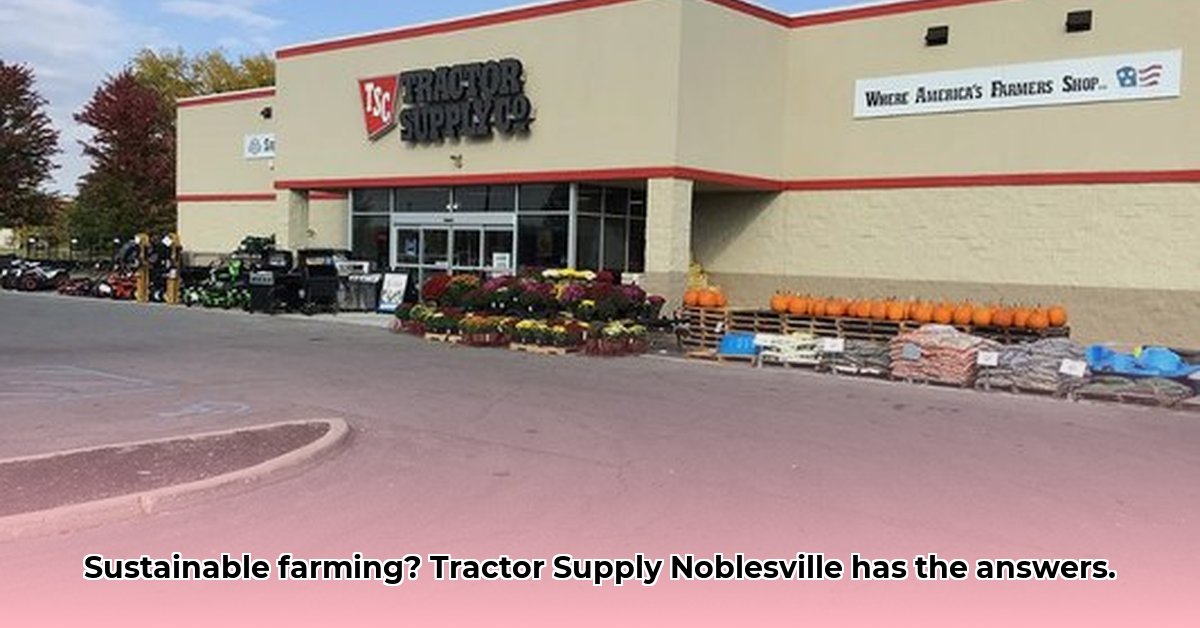
Assessing Tractor Supply's Commitment to Sustainable Agriculture in Noblesville
Tractor Supply Company (TSC) in Noblesville, Indiana, serves a broad customer base, ranging from small-scale gardeners to large-scale farmers. While the store offers a wide array of products seemingly relevant to sustainable agriculture – organic seeds, water-saving irrigation systems, and composting tools, for instance – a critical analysis reveals a significant gap in transparency regarding the company's overall commitment to sustainable practices. This lack of readily available information hinders a comprehensive evaluation of TSC's true environmental impact. Do their actions truly align with their product offerings? For example, learn more about sustainable pine bedding options here.
The Sustainability Puzzle: A Lack of Transparency
TSC's Noblesville store's product range could significantly contribute to sustainable farming. However, the absence of detailed information on sourcing, manufacturing processes, and environmental certifications creates a significant barrier to assessing their genuine dedication to sustainability. The company website provides limited details, making it difficult for consumers to make informed choices based on environmental considerations. This opacity undermines consumer trust and hinders the store's potential to act as a leader in promoting sustainable agriculture within the community. How can consumers confidently support sustainable practices if they lack crucial information about the products they purchase?
Serving a Diverse Clientele: A Significant Opportunity
The diverse clientele served by TSC Noblesville—from weekend gardeners to professional farmers—presents a substantial opportunity. TSC is ideally positioned to promote sustainable farming within the community by educating and empowering its customers. However, effectively reaching this diverse audience requires a tailored approach and a transparent commitment to sustainability. This presents a challenge, but also a considerable area for potential positive impact.
Making TSC Noblesville a Leader in Sustainable Agriculture: Actionable Steps
To effectively promote sustainable agriculture, TSC Noblesville must implement concrete, measurable steps:
Enhance Transparency: TSC should publicly disclose detailed information about its supply chain, including the sourcing of products and their environmental impact. Clear labeling that highlights eco-friendly certifications and sustainable sourcing practices will significantly boost consumer confidence.
Foster Community Engagement: TSC should organize workshops and educational sessions led by local agricultural experts, focusing on sustainable farming techniques. Collaborating with local farmers' organizations would further solidify their commitment and build trust within the community.
Prioritize Sustainable Product Selection: TSC should actively seek out and stock products from suppliers with demonstrably sustainable practices, prioritizing those with relevant certifications. This proactive approach will send a strong market signal and drive further positive change within the supply chain.
Establish Measurable Sustainability Goals: TSC should define and publicly report on specific, measurable, achievable, relevant, and time-bound (SMART) sustainability goals, including targets for reducing its carbon footprint and waste generation. This commitment to transparency and accountability will demonstrate their genuine dedication to environmental stewardship.
What Can Consumers and Farmers Do?
Consumers and local farmers play a vital role in shaping the future of sustainable agriculture. Consumers can actively choose eco-friendly products, demand clearer labeling, and support businesses committed to sustainable practices. Local farmers can collaborate with TSC, providing feedback on product selection and advocating for sustainable sourcing. Their collective voice can significantly impact industry practices.
Building a Sustainable Future: A Collective Effort
The path toward sustainable agriculture requires a collaborative effort. TSC, local farmers, and consumers must work together to prioritize transparency, community engagement, and responsible sourcing. By actively promoting and supporting sustainable practices, we can construct a more environmentally responsible future for farming in Noblesville and beyond. The journey toward sustainability is ongoing, requiring constant commitment and collaboration from all stakeholders.